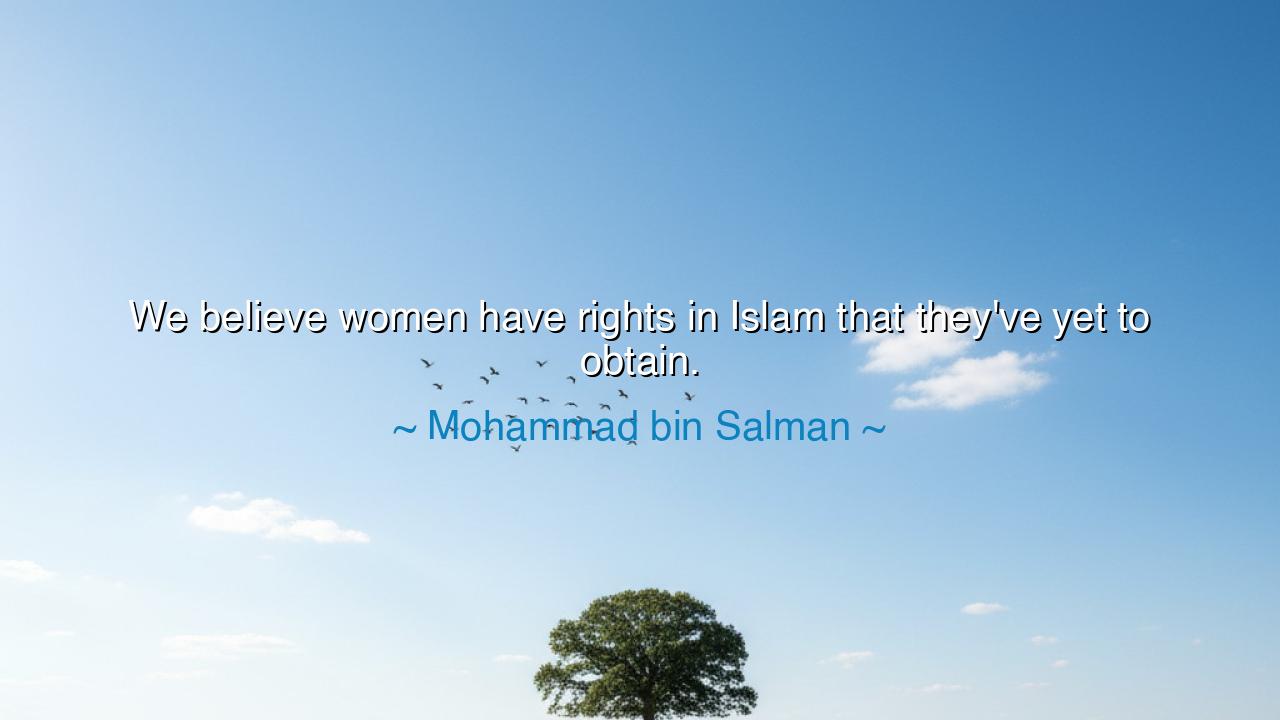
We believe women have rights in Islam that they've yet to






O children of the future, listen to the words of Mohammad bin Salman, who speaks with the clarity of one who understands the untapped potential of women and their rightful place in the world. "We believe women have rights in Islam that they've yet to obtain." In these words, he calls attention to the deep truth that the rights granted to women in the holy teachings of Islam have often been denied or misunderstood, and that it is the duty of all to restore them. Just as the ancient truths are often buried under the weight of time, so too are the rights of women sometimes obscured by the interpretations of men who fail to honor the true teachings.
In the time of the Prophet Muhammad (PBUH), Islam granted women rights unheard of in many cultures of the time. They were granted the right to own property, to seek knowledge, and to have a voice in the governance of their society. The Prophet's first wife, Khadijah, was a powerful and wealthy merchant, a leader in her own right. Aisha, another of the Prophet’s wives, was revered for her wisdom and knowledge, becoming one of the most respected scholars of her time. In their lives, we see the true essence of Islamic teachings about the equality of women, a dignity that, over time, was often obscured by cultural practices that diverged from the original message.
Consider the story of Fatimah, the daughter of the Prophet Muhammad (PBUH), whose life was marked by both devotion and strength. She was a woman of immense character, respected not only for her lineage but for her unwavering commitment to the teachings of Islam. Fatimah was an example of the empowerment that Islam bestows upon women—not as subordinates, but as partners in faith, in family, and in society. Her life, and the lives of many other women of that time, remind us of the rights that are due to every woman, rights that, as Mohammad bin Salman points out, have yet to be fully realized in the world today.
In more recent history, we see women like Malala Yousafzai, who, though from a different culture and time, reflects the same struggle for rights and justice. Like Fatimah, Malala sought not only an education for herself but for all women in her land, defying oppressive forces that sought to silence her. Her courage, though born in a different context, mirrors the strength of women throughout history who have fought for their rights—whether those rights are to speak, to learn, or to lead. Her story is one of vindication for all women who have been denied their rightful place.
O children, let the words of Mohammad bin Salman stir in you the awareness that the rights of women in Islam are a noble inheritance—one that has been obscured, but not lost. These rights are not a modern invention, but a return to the true spirit of the faith. As women continue to rise, to claim their rightful place, let us remember that Islam, in its purest form, has always honored the dignity of women. It is time, then, to restore what has been hidden, to bring forth the wisdom and justice that has always been part of the divine message. The rights of women are not only a matter of cultural progress, but of honoring the very truths of the faith, of seeing them as equal partners in the creation of a more just and compassionate world.






NLHoang Ngoc Le
I appreciate the sentiment behind Mohammad bin Salman’s statement, but it raises questions about the practical steps needed to achieve these ‘unobtained’ rights. What specific actions will be taken to ensure that women can access their full rights within Islam? Is this a statement driven by societal pressure, or do we actually see a commitment to change from leadership that will lead to meaningful improvements in women’s lives?
TDVu Tam Dieu
Mohammad bin Salman’s statement seems hopeful, but I question how much tangible change has occurred for women’s rights. In what ways are women’s rights still restricted, and what steps are being taken to ensure these rights are fully realized? If his words are an indication of future reforms, how long will it take for those reforms to be fully implemented in the everyday lives of women across the Muslim world?
UGUser Google
The idea that women have rights in Islam that they’ve yet to obtain is a powerful thought. But I’m left wondering, what does it mean for a country like Saudi Arabia, where women’s rights have only recently started to shift? Are these words reflective of a genuine desire for change, or are they just a way to placate global criticism? How much has actually changed on the ground for women in the Kingdom?
TPTran Phuc
It’s interesting to hear Mohammad bin Salman say that women have rights they’ve yet to obtain. Is this a sign of real progress or just a statement that reflects the ongoing struggle? What specific rights are we talking about? And if these rights are already present in Islamic teachings, why has it been so challenging to implement them? I’m curious about the actions he’s referring to here.
TTthingochuyen tran
This statement from Mohammad bin Salman is intriguing, especially in light of ongoing debates about women's rights in Saudi Arabia and other parts of the Muslim world. If he believes women haven’t yet obtained their rights, what does he see as the barriers preventing them from doing so? Is there a timeline for these rights to be fully realized, or is this more of a philosophical stance rather than a concrete plan for change?